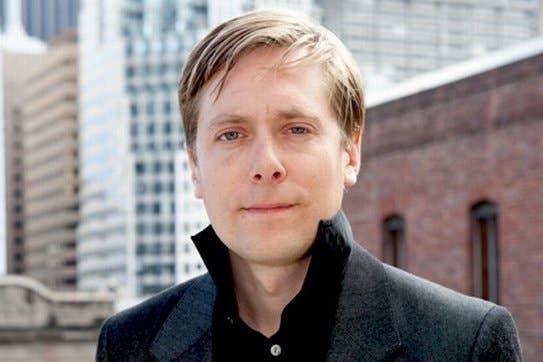"If you're in your comfort zone, you're declining or you're dying"
Unity CEO David Helgason on the "balancing act" of satisfying a community while staying ahead
The crowd has assembled outside Seattle's Oliver McCaw Hall to see David Helgason, the CEO and co-founder of Unity Technologies, have a bucket of ice and water dumped over his head. Less than ten minutes earlier, Helgason had been onstage, wrapping up a two-hour keynote address in which he laid out the full breadth of services his company now offers, and its plans for the years ahead. Few CEOs could slip so seamlessly between the professional and the playful. With Helgason, as with Unity in general, the line is so blurred it may as well not exist at all.
As the years pass, however, Unity has grown far beyond the upstart idealism of its early days. The stats are enough to make a person dizzy: 8.7 billion app installs, 640,000 monthly active users, with 47 per cent of all mobile developers signed up for some version of its engine. “It puts a lot of burden on our shoulders,” Helgason says, and carrying that weight has pushed the company in directions that he and his co-founders could never have expected.
I always feel out of my comfort zone. It's my personality, and I think I'm lucky to have that. But I also believe that it's really important for good technology companies to have that drive, so I probably engendered it [within the company]. If you're in your comfort zone for too long, you're declining or you're dying. You have to be out there pushing yourself. We've managed to keep that edge.
"The objective remains to democratise game development. Under that umbrella we really have to pick our battles"
Sure. And to acquire people, too.
And we've only done two acquisitions before. One of those wasn't even a full acquisition; it was a really sharp tech team from a company that is now Unity Boston. And before that it was Mecanim, which was, at that time, three guys in Montreal. So it was three people in, I don't know, 2010 or something, and then five people last year. This year it was 60 people. It was a real step up.
It makes sense. And it makes sense because we always take it back to that core question: if you set out to democratise game development, what does that imply? And we realised that we have great tools, a great engine, we have the Asset Store. But then we realised that these people [Unity's users] live and die by two questions. First, can I create a great game? And second, can I connect it with an audience? You just need to think in a structured manner about that.
Of course, we're not going to do everything. We license SpeedTree, we license PhysX on the tools side and the engine side. We have a lot of people who've supported us through the Asset Store, with various SDKs for various services. But what we've realised is that there are some services that will just be better if we make them, or if we take in a really good team and boost it up to the scale of Unity.
Yeah. We realised that our development community didn't feel very well served by a lot of the services companies. I mean, there are exceptions - they're not all bad.
Honestly, I don't have a really good word for it. The objective remains to democratise game development. Under that umbrella we really have to pick our battles. There's an infinite number of tasks and projects, and we choose the ones where we can do something significantly better than others, or make those things better by bringing them into Unity.
Like Unity Ads and EveryPlay - these things become much more valuable by having scale. There's no such thing as a niche ad network. They were already doing well. As part of Unity we think it can be much bigger, and therefore more liquid and better for the developer. That's the kind of company we are. We focus on leverage.
"I think Microsoft has shown a genuine willingness to be open. If anything, as you open up it's easy to be overwhelmed"
We would love it if they knew Unity, yes. And with Unity EveryPlay more and more people are seeing that. Only 5 million people had engaged with it around the time we did the acquisition; now it's 15 million. That's more than 10 million extra people in that network in 6 months. We showed some of the new social features today, but we're really doubling down on that. We think it's something developers deserve: the access to those community features, and the ability to engage directly with their players.
Well, the fact that, historically, that question has a negative answer is also why we didn't bother. We could have forced everyone to include our logo, but that wasn't really our thing. Many people were nice about it and put our logo in, or put a thank you in the credits, but if it only had value to us we weren't going to push it. Now that we can do it through a unified platform that players can engage with it starts being valuable for the developer. Even then, we're not pushing it. We're just offering.
Yeah, I think it can. Definitely, way more people know the name Unity now than a year ago.
What really feels exciting there is helping developers to take games internationally. A lot of the stuff we're doing with Unity Games is taking products into China, into Japan, and taking Asian games into other countries. I'd still call Unity Games experimental in the sense that it's not a full thing that we can push the throttle on.
Yeah, yeah. That was our sense within the company, too, so I'm glad to hear that.
"The Unity Ads system also makes money. We paid out $20 million to our customers in 2014, and that has grown quite fast"
I don't know about the gamers themselves. There are so many of them, and they're so different. I think in that very big universe of gamers, across all platforms, I think you can now find an audience for almost any kind of game - as long as they're not bad. Probably some of the bad games, too, actually.
I haven't seen the comments.
[Pauses]. I've learned not to be a spokesperson for other companies, because I don't know exactly what they're thinking. I think Microsoft has shown a genuine willingness to be open. If anything, as you open up it's easy to be overwhelmed, because there's a really big community of game developers who want a lot of different things.
I don't know if they do, actually. I want them to be as open as possible, because I think you can create marketplaces that manage themselves on some level.
Maybe. If you look over at the PC it is very vibrant. You get this really crazy stuff that somehow feels at home there.

We're software developers, so we like giving our stuff away for free. Honestly, if we could, it would all be free, but we have to pay the bills and it has to work as a thing for the long-term. As people have built their careers and their companies leaning on us, we can't just go away. It's a balancing act.
Looking back, we've never really raised our prices and we've lowered a bunch of them - stuff that used to cost money is now free, including a bunch of the platforms that you'll never have to pay for. WebGL, Xbox One, Wii U.
It has to be. We're really good at servicing smaller developers, but we can also service big developers, who we can sell support and things like that, which we can charge them a bit extra for. That helps balance that equation. And the Asset Store makes money.
And now - and I think this is really important for the future - the Unity Ads system also makes money. We paid out $20 million to our customers in 2014, and that has grown quite fast. What's exciting there is that's another way of funding the development of the engine.
"We're on very safe ground. Should something decline we'll be ready to make corrections to avoid crashing, but that's not the case"
I mean, yeah, we have all kinds of internal guesses, but they really are just guesses. What I can say is that we're very bullish on what we're doing. We see the industry has grown, we see that the section of games built with middleware has grown, and our section of that middleware pie has grown. It's like three growth curves on top of each other, so overall we feel good about the future.
But we're also very conservative in the sense that we always have a fair amount of cash in the bank. We haven't raised money in years. Some companies need to raise money every few years, but that's not us. We're on very safe ground. Should something decline we'll be ready to make corrections to avoid crashing, but that's not the case.
I think so, to some level. We didn't invent subscriptions; we introduced it to the game engine space. We also introduced freemium to the game engine space in '09, right? We've probably been ahead of the curve in many ways, and I think we can say that we've had some pretty fundamental innovations. Like the Asset Store is a huge innovation, and I think you could say that to tie the services together and bring it out as an end-to-end solution is innovative. But we're really just trying to do what the market wants us to do.
It's a good question, and there's some truth to that. We can only survive if we keep on innovating and being true to our goals. The stuff we're doing with Unity Ads and with EveryPlay is very powerful, and if it works out - which I'm confident it will, because it's already working well - that will make us very robust.
I guess not [laughs]. Honestly, you get to meet them more often than I do.

